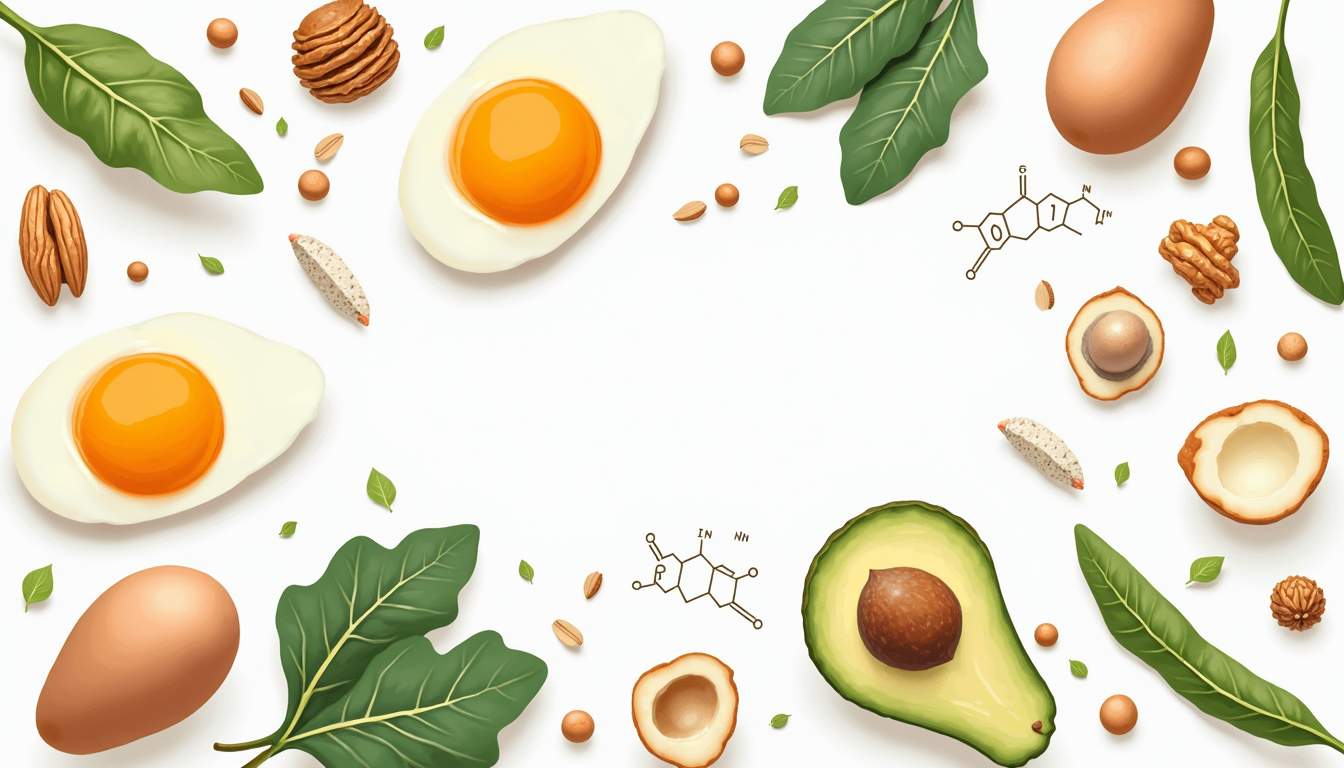Biotin supplements have gained popularity in recent years, particularly among those seeking to improve their hair, skin, and nails. This essential nutrient plays a crucial role in various bodily functions, making it a topic of interest for many health-conscious individuals. This article will explore the fundamentals of biotin, its benefits, and how to choose the right supplements for your needs.
What is Biotin Used For?
Biotin, also known as vitamin B7, supports energy metabolism and helps strengthen hair, skin, and nails. It aids in the production of keratin, improves nail strength, and may also support cognitive function and blood sugar regulation.
Understanding Biotin Basics
What is Biotin and Its Role in the Body
Biotin, also known as vitamin B7, is a water-soluble vitamin that is part of the B-complex group. It is essential for the metabolism of carbohydrates, fats, and proteins. Biotin acts as a coenzyme, facilitating key enzymatic reactions that convert food into energy. This process is vital for maintaining overall health and wellness.

Beyond its metabolic functions, biotin is particularly well-known for its contributions to the health of hair, skin, and nails. It helps in the synthesis of keratin, a protein that forms the structural basis of these tissues. A deficiency in biotin can lead to various health issues, including hair loss, skin rashes, and brittle nails. In addition to these cosmetic benefits, biotin plays a role in maintaining a healthy nervous system and may even support cognitive function, making it an important nutrient for overall brain health.
Moreover, biotin's role extends to the regulation of blood sugar levels, where it may help improve insulin sensitivity. This is particularly beneficial for individuals managing diabetes or those at risk of developing the condition. Research suggests that adequate biotin levels can contribute to better glucose metabolism, which is crucial for energy production and overall metabolic health.
Recommended Daily Intake and Natural Sources
The recommended daily intake of biotin varies by age and gender. For adults, the adequate intake is typically around 30 micrograms per day. However, pregnant and breastfeeding women may require higher amounts to support fetal and infant development. Infants, children, and adolescents also have varying needs, highlighting the importance of ensuring that all age groups receive adequate amounts of this essential vitamin for optimal growth and development.
Natural sources of biotin include a variety of foods. Eggs, nuts, seeds, fish, meat, and certain vegetables like sweet potatoes and spinach are all rich in biotin. Incorporating these foods into a balanced diet can help maintain adequate levels of this essential vitamin. However, some individuals may still find it beneficial to take biotin supplements, especially if they have specific health goals or dietary restrictions. For instance, those following a vegan or vegetarian diet might struggle to get enough biotin from food sources alone, making supplementation a practical option to ensure they meet their nutritional needs.
Additionally, biotin is often included in beauty and wellness products, particularly those aimed at enhancing hair and nail health. Many shampoos, conditioners, and topical treatments tout biotin as a key ingredient, capitalizing on its reputation for promoting stronger, healthier hair. While the effectiveness of topical application is still a topic of research, the popularity of biotin in beauty circles underscores its perceived importance in holistic health and personal care routines.
What Does Biotin Do? Benefits, Best Sources, and When to Supplement
The Beauty Benefits of Biotin: Hair, Skin, and Nails
One of the most well-known benefits of biotin supplements is their potential to enhance hair, skin, and nail health. Many individuals report noticeable improvements in hair thickness and shine after taking biotin regularly. This effect is attributed to biotin's role in keratin production, which is essential for strong and healthy hair.
In addition to hair health, biotin may also contribute to improved skin appearance. Some studies suggest that biotin can help alleviate skin conditions such as dermatitis and acne. Its moisturizing properties may also enhance skin hydration, leading to a more radiant complexion. Furthermore, biotin's antioxidant properties can help combat oxidative stress, which is a significant factor in skin aging. By neutralizing free radicals, biotin may assist in maintaining youthful skin, reducing the appearance of fine lines and wrinkles.
Nail strength is another area where biotin has shown promise. Individuals with brittle nails may benefit from biotin supplementation, as it has been linked to increased nail thickness and reduced breakage. This can be particularly appealing for those who frequently engage in activities that put stress on their nails. Additionally, biotin may help prevent nail fungus and other infections, ensuring that nails not only look good but are also healthy and resilient.
How Biotin Supports Energy and Metabolism
Beyond cosmetic benefits, biotin plays a significant role in metabolic health. It is involved in the conversion of food into energy, which is crucial for maintaining stamina and overall vitality. Some research suggests that biotin may help regulate blood sugar levels, making it potentially beneficial for individuals with diabetes or those at risk of developing the condition. This regulation can lead to more stable energy levels throughout the day, reducing the likelihood of energy crashes that can affect productivity and mood.
Moreover, biotin is essential for neurological function. It contributes to the production of neurotransmitters, which are vital for communication between nerve cells. Some studies indicate that adequate biotin levels may help improve cognitive function and reduce the risk of neurological disorders. In fact, biotin deficiency has been linked to symptoms such as depression and cognitive decline. By ensuring sufficient biotin intake, individuals may support not only their mental clarity but also their emotional well-being, creating a holistic approach to health that encompasses both body and mind.
Choosing the Right Biotin Supplement for Your Needs
Biotin Dosage and Safety: What You Need to Know
Biotin supplements come in various forms, including capsules, tablets, gummies, and liquid drops. Each form has its own advantages, and the choice often depends on personal preference. Gummies, for example, are popular for their taste and ease of consumption, while capsules may be more suitable for those who prefer a straightforward approach. Liquid drops can be particularly beneficial for individuals who have difficulty swallowing pills or for those who want to customize their dosage easily. Additionally, some brands offer biotin-infused beauty products, such as shampoos and conditioners, which claim to deliver the benefits of biotin directly to the hair and scalp.

When selecting a biotin supplement, it is essential to consider the dosage. Most supplements contain between 30 to 10,000 micrograms of biotin per serving. For general health and maintenance, a lower dosage (around 30 to 100 micrograms) is typically sufficient. However, individuals seeking specific benefits, such as improved hair or nail health, may opt for higher doses. It is advisable to consult with a healthcare professional before starting any new supplement regimen to determine the appropriate dosage for individual needs. It's also worth noting that biotin is a water-soluble vitamin, meaning that excess amounts are usually excreted through urine, which can provide some reassurance regarding its safety when taken in moderation.
Potential Side Effects and Interactions
While biotin is generally considered safe and well-tolerated, some individuals may experience side effects, particularly at higher doses. Common side effects can include mild gastrointestinal discomfort, such as nausea or diarrhoea. These symptoms are usually temporary and may resolve as the body adjusts to the supplement. Furthermore, some users have reported skin rashes or allergic reactions, although these instances are rare. It is advisable to start with a lower dose and gradually increase it to monitor how your body reacts.
It is also important to be aware of potential interactions with other medications. Biotin can interfere with certain lab tests, leading to inaccurate results, particularly in thyroid function tests. Therefore, individuals taking biotin supplements should inform their healthcare provider about their use of biotin to ensure accurate testing and monitoring. Additionally, those on medications for diabetes should exercise caution, as biotin may affect blood sugar levels. It’s crucial to have open discussions with healthcare providers about any supplements being taken, especially if you are managing chronic health conditions or are on multiple medications.
In conclusion, biotin supplements offer a range of potential benefits, particularly for hair, skin, and nail health. Understanding biotin's role in the body, recommended intake, and the various forms available can help individuals make informed decisions about supplementation. As with any dietary supplement, consulting with a healthcare professional is recommended to ensure safety and effectiveness.

Share:
How to Maximize the Benefits of Taking Collagen and Vitamins Together
What Are Biotin Tablets and How Do They Help Hair?